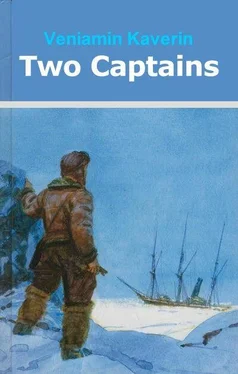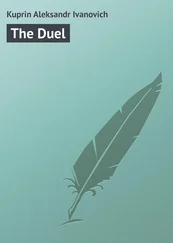After two or three hours, as usual, each compartment settled down to a life of its own, unlike that of its neighbours, as though the ceiling-high wooden partition divided not so much the carriage as people's thoughts and feelings. Some compartments were gay and noisy, others dull. Ours was gay because the girls, after mildly lamenting the fact that they had not succeeded in staying in Moscow for their summer field work and saying something catty about a certain Masha who had succeeded in doing so, started to sing and all the evening Katya and I were regaled with modern war songs, some of which were very amusing. In fact, the girls sang all the way to Ensk, even in the night-for some reason they decided to go without sleep. The thirty-four-hour journey passed quickly enough as we dozed on and off to the sound of these young voices, singing songs now sad, now gay.
The train used to arrive early in the morning, but now it arrived towards the evening, so that when we got out, the little station struck me, in the dusk, as being nice and cosy in an old-fashioned sort of way. But the Ensk of former days stopped where the broad avenue of lime trees leading to the station ended. Coming out onto the boulevard, we saw in the distance a dark mass of buildings over which sped glowing clouds lit up from below. This, for Ensk, was such a strange townscape that I found myself saying to the girls that there must be a fire somewhere across the river, and they believed me because I had been boasting during the journey that I was a native of Ensk and knew every stone in the place. As it turned out, it wasn't a fire, but an ordnance factory which had been built at Ensk during the war.
I had seen the striking changes that had taken place in some of our towns during the war-those at M-v, for instance-but I had not known those towns as a child. Now, as Katya and I walked quickly down the darkening Zastennaya and Gogolevsky streets it seemed to me that these streets, which used to stretch lazily along the ramparts, now ran hastily upwards to join the ceaseless glowing motion of the clouds over the factory buildings. This was our first (and true) impression-that of war-geared town. To me, of course, it was still my old, native Ensk, but now I met it as one does an old friend, when one looks at the altered yet familiar features, and laughs with affection and emotion, at a loss for words.
We had written to Pyotr from the Arctic that we would be visiting the old folks and he counted on being able to arrange his long-promised leave for the same time.
No one met us at the station, though I had wired from Moscow, and we decided that Pyotr had not arrived. But the first person we ran into at the lion-guarded entrance to the Marcouse house was none other than Pyotr. I recognised him at once for all that he had been transformed from an absent-minded, wool-gathering old thing with a permanent question-mark expression into a bronzed dashing officer. "Ah, here they are!" he said as though he had found us at last after a long search.
We embraced, then he strode over to Katya and took her hands in his. They had their Leningrad in common, and as they stood there gripping hands, even I was far away from them, though there was probably not a person in the world nearer to them than I was.
Aunt Dasha was asleep when we burst into her room and must have thought she was dreaming. She raised herself on her elbow and regarded us with a pensive air. We started laughing and that brought her down to earth.
"Good heavens, Sanya!" she said. "And Katya! And the old'un is away again!"
The "old 'un" was the judge, and "away again" referred to that visit of ours five years ago when the judge had been out on circuit somewhere in the district.
I hardly need describe how Aunt Dasha fussed and bustled round us, how she grieved that the pie had to be made with dark flour and on some "outlandish lard". In the end we had to make her sit down while Katya took charge of the household and Pyotr and I volunteered to help her, and Aunt Dasha shrieked with horror when Pyotr dumped some food concentrates into the dough-"for flavour", as he put it-and I all but popped in some washing soda instead of salt. Oddly enough, the pastry rose well, and though Aunt Dasha tasted a piece and announced "not rich enough", the pie was not at all bad as a wartime product.
After dinner Aunt Dasha demanded that we tell her everything, beginning from the day and hour when we had parted from her at the Ensk railway station five years before. I persuaded her, however, that such a detailed report ought to be put off until the judge came home. Instead, we made Pyotr tell us about himself.
I listened to his story with emotion. I had known him for over twenty-five years, and he did not strike me at all as being now a different person as Katya had described him to me. The "artistic vision" that had always intrigued me in Pyotr and which distinguished him from the ordinary run of men, had now deepened, if anything.
He showed us his albums-for the last year Pyotr had been serving as a scenic artist with a frontline theatre. Here were sketches of military life, often hastily dashed off. But the moral fibre of our people, which everyone knows who has spent even a few days in the army, was caught in them with remarkable fidelity.
I had often stopped before unforgettable scenes of war, regretting that they vanished without a trace as one gave place to another. Now I was seeing them in bare outline, but none the less faithfully and brilliantly reproduced.
"There," Pyotr said with a good-natured smile when I had congratulated him, "and the judge says they're no good. Not heroic enough. My son draws too," he added, pushing out his lower lip, as he always did when pleased. "He's not bad, he has a gift, I think."
Katya got Nina Kapitonovna's letters out of the suitcase-the old lady was still living near Novosibirsk with little Pyotr-and Aunt Dasha, who had always been interested in Grandma, demanded that some of them be read out aloud.
Grandma was still living on her own after her quarrel with the Farm Manager, despite the fact that he had offered her apologies and asked her to come back. She had "thanked him and declined, as I had never been taught to sue for a favour", as she wrote. Having had the satisfaction of declining this invitation, she astonished the whole district by suddenly taking on a job in the local Recreation Hall.
"I am teaching dress-making," she wrote briefly, "and I congratulate you and Sanya. I sized him up long ago, when he was a little fellow. I fed him buckwheat porridge to make him grow. He's a fine boy. Don't you bully him, you've got a nasty temper."
This was in answer to our letter telling her that we had found each other.
"I didn't sleep all night for thinking of poor Maria," she wrote on receiving the news that the remains of the expedition had been found. "I thought it was for the best, her not knowing the terrible fate your father suffered."
Little Pyotr was quite well, and had grown a lot, to judge by his photograph. He resembled his mother more than ever. We thought of her and sat in silence for a long time, reliving as it were, the anguish of that senseless death. As far back as the spring Katya had taken steps to get a pass for Grandma and the boy to come to Moscow, and there was a hope that we should see them on our way back.
Our old idea, Katya's and mine, of all of us settling down in Leningrad as one family was repeated that evening more than once. A single family-with Grandma and the two Pyotrs. Pyotr Senior looked rather confused when, speaking of the flat which we had already received in imagination-and not just anywhere but in Kirovsky Prospekt-we assigned to him a studio in a quiet part of the flat where nobody would be in his way. I knew of one woman he did not mind being in his way, a woman of whom Katya spoke with enthusiasm. But that evening of course, nobody said a word about her.
Читать дальше












